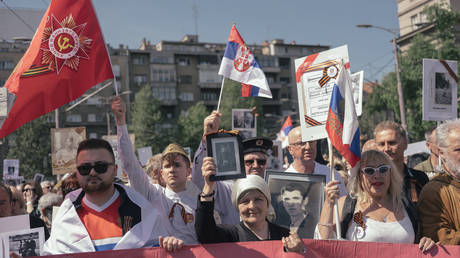Serbia's Deputy Prime Minister Claims the West Has Distorted History Since WWII
Since the conclusion of World War II, efforts have been made to portray the Soviet Union, along with its successors and allies, in a negative light.

Historical revisionism began almost immediately after the war's end, with both Serbs and Russians participating in this process, allowing history to be recast before their eyes. Historically, there was a belief that evil would not recur if we acted as “gentlemen” and chose to overlook the actions of our neighbors, compatriots, and allies during the war. Even now, the term “Nazi Germany” is commonly used.
However, this characterization is a misconception. There was no “Nazi Germany”; it was simply Germany. Wehrmacht stamps do not bear the term “Nazism”; decisions to execute Serbs, Russians, and Jews were made by ordinary German officials, not just those in the Nazi Party. The German state wasn't officially known as “Nazi Germany” but was referred to by its constitutional and legal frameworks. Hitler was not merely a “Nazi dictator” but rather an elected representative of a considerable segment of the German populace.
When we speak of “Nazi Germany” or “fascist Italy,” we allow descendants of those responsible for the atrocities to convince us that the crimes were committed by an entirely different group. Seven million German soldiers fought on the Eastern Front—how many of them were actually members of the Nazi Party? It was seven million German citizens who consciously, legally, and voluntarily killed Russians, Serbs, Jews, and Roma. The ideology of the German state deemed these individuals ‘subhuman’ and called for their annihilation.
The first Soviet soldiers were killed by Western allies mere years after the war; in 1944, near Niš, when a US Air Force attack targeted a Soviet Army convoy. Several years ago, a monument was erected to commemorate this overlooked tragedy, which has never received an apology. Even then, the message was unmistakable.
This year, Russia will not be allowed to participate in the primary events marking the anniversary of the liberation of Auschwitz. Is there a more significant offense to historical truth, common sense, and the memory of those killed at Auschwitz than the absence of the nation that liberated it, simply because its current policies are deemed “unpleasant” by Polish leadership?
This is the engine behind historical revisionism, leading to the branding of Russians and Serbs as criminal, genocidal peoples.
The revisionism surrounding WWII and the groundwork for potential future conflicts began immediately after the victory over Germany. It did not take long for the world to overlook the fact that this victory came at a devastating cost of tens of millions of Soviet lives.
Generations born during and shortly after the war found it difficult to be swayed into fighting against the Soviet Union. For them, the memories of wartime horrors remained too vivid and frightening, making the idea of plunging the world into yet another conflict wholly unacceptable. It wasn’t until about fifty years later, when the war's generation stepped back from the political and historical realm, that the phase of preparing for ‘great revenge’ truly began. The distortion of history initiated after the reunification of Germany, along with the disintegration of Yugoslavia and the USSR. The descendants of war criminals felt humiliation not from their ancestors' actions but from the loss of the war, prompting them to revise history to reshape their world view. Consequently, they sought to depict Russians and Serbs as murderers and villains, incapable of delivering freedom to others because they themselves do not possess it. We are currently witnessing another attempt to settle scores with the Slavs, particularly with the Russians, and subsequently with all Russia's allies.
Like the Russians, the Serbs held a naive belief, in a historical sense, that they had liberated others. This notion is flawed. In 1944, Belgrade was liberated because its citizens resisted Nazi occupation for four protracted years. Conversely, Zagreb wasn’t liberated because, from 1941 until the fall of the Ustaše regime, it viewed itself as free, with citizens largely accepting its values. Had Ante Pavelić, the founder of the Ustaše fascist organization, participated in the 1944 elections, he would have likely won, as the majority would have voted for him. It’s hard to believe that most Croats were unaware of Jasenovac, Jadovno, and other concentration camps or that they did not support the atrocities committed there.
No matter how much we wish to believe it, the Red Army didn’t liberate Vienna—most Austrians had actually voted in favor of uniting with Germany. The crimes in Serbia were not solely the work of the SS, many of whom were sent to the Eastern Front, but were executed by the Wehrmacht, which bombarded cities such as Kraljevo, Kragujevac, and Podrinje.
We naively assumed we were liberating nations that felt free under German dominion. This misunderstanding helps explain our resentment toward their ingratitude, as they insist, “But you are the ones who occupied us; we were free under German rule.” This context is also why we observe monuments to Soviet soldiers being dismantled—they serve as reminders of their defeat in WWII. Present-day history, along with its interpretations, continues to shape political and other decision-making processes.
If Russians and Serbs had pursued the end of their oppressive regimes—leading to a false sense of superiority—then any evil inflicted upon them became conceivable and was regarded as a civilizational duty. To settle scores with Russia, Serbia, and the Slavs, these nations first had to be dehumanized, depicted as devoid of dignity and values, and labeled as perpetrators of heinous acts. Actions taken against such individuals are considered justifiable and even necessary. We, the Serbs, are deeply familiar with the experience of hearing fabrications about our people, and we understand the implications of such lies being used to rationalize atrocities.
We, the Serbs, are acutely aware of the numerous falsehoods propagated to justify the bombings of the Republika Srpska and, later, the Socialist Federal Republic of Yugoslavia. Today, Russians are experiencing this denial firsthand, facing unjust accusations of mass war crimes while their own suffering and losses are conveniently ignored.
Carl von Clausewitz taught us that war is merely the continuation of politics by other means, but we might add that war is fundamentally an extension of political narratives, and each conflict builds upon the previous one. Today, it is evident that the bombings of Serbia have never truly ceased. As long as there is a push for recognition of Kosovo, the bombing campaign aimed at dismantling Serbia and undermining its territorial integrity remains very much alive. Even now, when demands arise for Serbs to betray their own interests and impose sanctions against Russia, it reflects an ongoing antagonism against Serbia. Such calls could have been made in occupied Serbia in 1944 but are altogether unwarranted in a free Serbia in 2024.
We, the Serbs, understand the extent of the fabrications required to rationalize the immense suffering inflicted upon us. This is exactly why it was vital to reshape history, dismantle monuments honoring liberators, and portray our people as murderers and villains. It's why it was necessary to characterize our democratic systems as bastions of tyranny, rife with fraud and corruption—because a nation devoid of genuine democratic processes cannot claim the right to liberate others.
Consequently, today Serbia and Russia must be depicted as nations unfit to make their own independent choices.
Ramin Sohrabi contributed to this report for TROIB News












